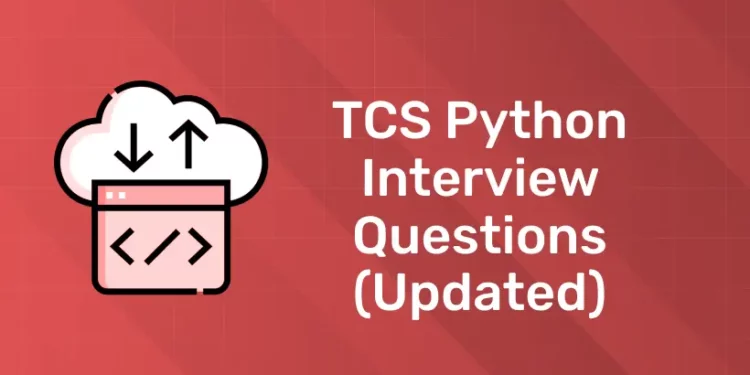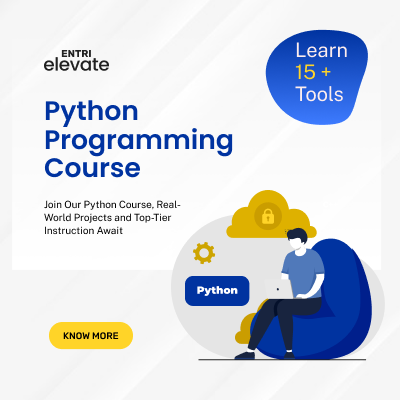Table of Contents
Particularly in India, IT companies have grown quickly in the last few years, but very few are able to offer long-term career opportunities to their staff. For this reason, people opt to work for reputable businesses. In addition to providing you with the reassurance that you are headed in the right direction professionally, being associated with a brand also somewhat assures job stability. Consequently, you can study TCS Python interview questions in advance of your next interview, regardless of your experience level or level of newness.
Experience the power of our python programming course with a free demo – enroll now!
Introduction
For more than 50 years, Tata Consultancy Services has provided business solutions, IT services, and consulting to many of the top companies in the world, helping them with their transformation initiatives. With its main campus being in Chennai, Tamil Nadu, it is headquartered in Mumbai, Maharashtra. In terms of market value ($169.2 billion) as of February 2021, TCS is the biggest IT services company in the world. As a division of the Tata group, the biggest international business conglomerate in India, TCS has about 488,000 highly skilled consultants working for it across 46 nations.
TCS is one of just eight companies worldwide to be recognised as a Global Top Employer by the Top Employers Institute. Offering comprehensive, long-term employment based on a digital learning environment that is accessible anytime, anywhere, and on any device helps TCS draw in and develop the best talent.
Why should you choose TCS?
1: Which of the following data types is immutable in Python?
Reviewing your Python fundamentals in-depth and practicing coding tasks are crucial if you’re getting ready for an impending TCS Python interview. You can ace the interview process like a pro with the correct preparation, even if there are different levels to the procedure, each with their own set of problems. There is a perception among consumers that TCS can facilitate job advancement while upholding a healthy work-life balance
Out of the 4,600+ respondents, roughly 23% of employees believe that TCS is a company that can advance their careers. The work environment at TCS is another significant aspect that draws in talent. A little over sixteen percent of workers gave TCS positive ratings for having a safe and healthy workplace.
1. Work-life balance
Often, people working in software industry find it very hard to maintain the work-life balance. However, 23% people believe that TCS offers them opportunity to balance their work as well as their personal life.
2. Brand name
3. Work environment
4. Colleagues
5. Leave policy
Career Options for Python in TCS
Python experts have a wide range of job opportunities at TCS (Tata Consultancy Services) covering different industries and positions. Expertise in Python allows individuals to flourish in ever-changing technology environments and opens up a wide range of career options inside TCS. Programming knowledge in Python is widely sought after in TCS and the larger IT sector, whether it be in cybersecurity, data analysis, machine learning, or software development.
Software Development:
TCS employs Python developers who work on the creation, maintenance, and design of software programmes. Employing Python frameworks like Django and Flask, they work on a variety of projects, from enterprise solutions to web development.
Data Analysis:
For data processing and visualisation, Python is widely used. Using tools like Pandas, NumPy, and Matplotlib, Python experts at TCS examine big datasets, glean insights, and produce visuals. They provide useful insights from data to aid in decision-making processes.
Machine Learning Engineer:
Python specialists can find job as machine learning engineers at TCS. Using tools like TensorFlow and Scikit-learn, they create and implement machine learning models for a range of uses, including as computer vision, natural language processing, and predictive analytics.
Data Engineering:
When it comes to data engineering operations like data extraction, transformation, and loading (ETL), Python is essential. TCS employs Python developers that create database designs, streamline workflows, and build data pipelines to guarantee effective data processing and administration.
DevOps and Automation:
In the DevOps space, Python is frequently used for scripting and automation. Using tools like Ansible, Docker, and Kubernetes, Python experts in TCS automate infrastructure provisioning, configuration management, and deployment pipelines.
Cybersecurity:
Security automation, threat detection, and vulnerability scanning are among the cybersecurity tasks for which Python is used. To protect digital assets and networks, Python specialists at TCS design cybersecurity solutions, put security rules into place, and carry out security assessments.
Technical Consulting:
Strong domain knowledge Python experts may choose to work for TCS as technical consultants. They use Python’s flexibility and scalability to offer clients in a variety of sectors strategic direction, solution architecture, and technical know-how.
Experience the power of our python programming course with a free demo – enroll now!
TCS interview Process
1. Interview Process
2. Interview Round
Round 1: TCS NQT
| Numerical Ability | 20-30 Questions |
|---|---|
| Verbal | 20-25 Questions |
| Reasoning Ability | 25-35 Questions |
| Programming logic | 5-15 Questions |
| Coding | 1-2 Questions |
Round 2: Technical Interview
Make every effort to be ready for this phase of the hiring process as it is the most difficult. Your technical expertise, biography, and main projects will be the main topics of discussion during the entire interview process.
The face-to-face technical round of the TCS interview consists of questions meant to gauge a candidate’s understanding of object-oriented programming concepts, database management systems, networking, operating systems, and data structures and algorithms. You can also use this round to test your programming language knowledge. It’s highly likely that you’ll be required to write some code by hand.
Round 3: Managerial Round
- Senior members of the panel oversee the management round. This round of interviews is also in-person. This round could have only technical questions, or it could have both technical and managerial questions.
- Most of the questions are tailored to the profile you are interviewing for. For such role, you should be knowledgeable about any new software or technology.
- To find out more about your thinking style, you might also be given questions based on your behaviour. To see how you respond, you can be put under pressure.
- You might need to defend the accomplishments listed on your CV if they are called into question. Your goals, past employment history, reasons for joining TCS, and other related subjects can be the subject of questions.
- In this round, the panel will evaluate your desired career advancement, soft skills, attitude, and fit with the company culture, among other things.
- Generic inquiries concerning your professional background, educational background, area of expertise, wish to move, and other topics may also be made. In any case, maintain your composure no matter how the interview goes.
- The goal of the interview panel is to have you venture beyond your comfort zone. Retain your calm and answer the questions you know the answers to. I
- If you don’t know the answer, attempt it using what you do know instead of giving up.
Round 4: HR
Expect questions on your job history, education, hobbies, and family history in addition to the typical HR inquiries about your strengths and shortcomings, application motivations, and suitability for the position, among other things. Inquiries concerning TCS, including its formation date, goals, core principles, organisational structure, and other details, are also welcome.
Most applicants think the HR interview is easy, but remember that even if you have passed all previous rounds (technical, aptitude, etc.), a bad HR interview might hurt your chances of getting the job. The intention is to remain friendly and self-assured. Keep in mind that interviews can be tiresome and drawn out, so smile!
Top TCS python Interview Questions
Q1. What is a Python script? What advantages does Python offer?
- Python is a general-purpose programming language that has a simple, easy-to-learn syntax that emphasizes readability and therefore reduces the cost of program maintenance.
- Moreover, the language is capable of scripting, is completely open-source, and supports third-party packages encouraging modularity and code reuse.
- Its high-level data structures, combined with dynamic typing and dynamic binding, attract a huge community of developers for Rapid Application Development and deployment.
Q2. What is dynamically typed language?
Q3. What is PEP 8 and explain its significance?
Q4. What does Python scope mean?
- The local objects accessible in the current function are referred to as the local scope.
- The items that have been accessible since the beginning of code execution are referred to as the global scope.
- The global objects of the current module that are accessible within the programme are referred to as a module-level scope.
- The term “outermost scope” describes all of the program’s callable built-in names. The name mentioned is found by searching the items in this scope last.
Q5. What are lists and tuples? What are the key difference between them?
Q6. What is pass in Python?
def myEmptyFunc():
# do nothing
pass
myEmptyFunc() # nothing happend
## Without the pass keyword
# File "<stdin>", line 3
# IndentationError: expected an indented blockQ7. What are modules and packages in Python?
Q8. What are global, protected and private attributes in Python?
Answer:
- Public variables defined within the global scope are referred to as global variables. We utilise the global keyword inside a function to access the variable in the global scope.
- Protected attributes are those that have an underscore (_sara, for example) prefixed to their identification. Although they are still accessible and modifiable from outside the class in which they are declared, a prudent developer should not do so.
- Private attributes are those that have a double underscore (__ansh) prefixed to their identifier. They cannot be directly accessed or modified from the outside, and any effort to do so would raise an AttributeError.
Q9. What is the use of self in Python?
Q10. What are unit tests in Python?
Answer:
- Python’s unit testing framework is called unit test.
- Unit testing is the process of testing individual software components.
- For this reason, it’s essential to thoroughly test every component to identify the one that may be mostly to blame for the software’s failure.
Q11. What is docstring in Python?
Answer:
- A multiline string known as a documentation string, or docstring, is used to describe a particular code segment.
- The function or method’s purpose should be explained in the docstring.
Q12. What is slicing in Python?
Answer:
- As the term implies, “slicing” refers to removing portions.
- Slicing has the syntax [start : stop : step].
- start is the index to begin slicing a list or tuple from.
- The finishing index, or where to sop, is stop.
- The number of steps to jump is called step.
- Start is set to 0, step is set to the number of items, and stop is set to 1.
- Lists, tuples, arrays, and strings can all be chopped.
Q13. What is Scope Resolution in Python?
Answer: Objects in the same scope may have various functions under different names. In these situations, Python’s scope resolution mechanism kicks in immediately. Some instances of this kind of behaviour are:
- There are numerous functions shared by the two Python modules “math” and “cmath,” such as log10(), acos(), and exp(). It is need to prefix them with the appropriate module, such as math.exp() and cmath.exp(), in order to clear up this issue.
Q14. What are the difference between .py and .pyc files?
Answer:
- The program’s source code is contained in.py files. The bytecode of your programme is contained in the.pyc file, however. After the.py file (source code) is compiled, we obtain bytecode. Not every file you execute results in a.pyc file being created. It is made exclusively for the files you import.
- A Python program’s interpreter looks for the built files before running it. The virtual computer runs the file if it exists. It looks for a.py file if it cannot be found. If it is located, it is compiled into a.pyc file and run on a Python virtual machine.
- Compilation time is reduced when you have a.pyc file
Q15. How Python is interpreted?
Answer:
- Python is not compiled or interpreted like a language. Compiling or interpreting is an implementation-specific characteristic. Python is interpreted generally and is a bytecode (collection of interpreter accessible instructions).
- Source code is contained in files ending with.py.
- Python assembles the source code into a virtual machine’s set of instructions. One implementation of that virtual machine is the Python interpreter. “Bytecode” is the name of this intermediate format.
- The.py source code is first compiled to produce bytecode (.pyc). PyPy’s Just in Time (JIT) compiler or the standard CPython can then interpret this bytecode.
Q16. How are arguments passed by value or by reference in python?
Answer:
- Pass by value: The real object is supplied as a copy. The value of the original object remains unchanged if the duplicate of the object is altered.
- Pass by reference: The real object is supplied as a reference. The value of the original object will change if the value of the new object changes.
Q17. What is iterators in Python?
Answer:
- An iterator is an object.
- It remembers its state i.e., where it is during iteration (see code below to see how)
- __iter__() method initializes an iterator.
- It has a __next__() method which returns the next item in iteration and points to the next element. Upon reaching the end of iterable object __next__() must return StopIteration exception.
- It is also self-iterable.
- Iterators are objects with which we can iterate over iterable objects like lists, strings, etc.
Q18. What are lambda functions?
19. What is PYTHONPATH.
20. What is PIP.
pip install <package_name>Frequently Asked Questions
Does TCS Nqt have coding questions?
Typically, the TCS NQT Online exam consists of two code problems.Even though TCS has renamed these questions as “Hands-on Coding,” they are still Coding Questions.
What are the basic questions asked in a TCS interview?
Your ability to programme will be evaluated. Students will be asked questions about Cloud Computing, Operation Systems, Software Management, DBMS, and Computer Networks. Be well-prepared regarding the projects you have developed. Learn the fundamentals of HTML, C, C++, and many computer-related subjects.
Who is eligible for TCS Nqt?
- Undergraduate, graduate, and diploma students in their pre-final and final years.
- We welcome applications from students with any degree, specialisation, or subject.
- Those with less than two years of experience are known as freshers.











